Last week, I discussed why I personally thought we'd never see another television series like Lost.
Well, the Lost creative brass kind of feels the same way that I do.
In an interview with Jace Lacob of the Daily Beast, executive producers Damon Lindelof and Carlton Cuse talked about the impact that their baby has had on television as a medium. Here's the question from Lacob and their response to a question about serialization on television:
As Lacob notes in his question, after Lost, there were a slew of serialized series trying to become "the next Lost" -- and not one of those series has been successful.
The Daily Beast: While the May conclusion marks the end of Lost in its current incarnation, it also marks the end of a particular type of serialized storytelling on television. Following the success of Lost, several networks attempted to reproduce its magic, ordering a number of highly serialized shows meant to capitalize on Lost's success, including ABC's Invasion, Daybreak, and The Nine, NBC's Heroes andSurface, and CBS' Threshold. Of the Lost wannabes, none lasted more than a season other than Heroes, which has seen its own fortunes severely decline over the years.Cuse: We like to believe that we've sort of opened the door for certain types of shows that were not welcome on network television before Lost. It has led to the networks taking gambles with heavily serialized shows, and also genre shows. I mean, basically, there was no science fiction on the networks prior to Lost.Lindelof: Except for The X-Files, but they'd been off the air for at least five years.Cuse: At the point in which Lost started, there was nothing and it was not something that anybody was interested in. Clearly, there was an appetite for other shows.Heroes came along, debuted, and did very strongly for a few seasons. It proved that there was a network audience for shows, not just our show, but for other shows that were sort of heavily genre. We like to think that we opened the door.On the other hand, we feel a little bit like we're sort of blacksmiths in the Internet era. We're making this gargantuan show; we shoot it on 35mm film in Panavision. We often have multiple crews filming at the same time. We shoot it on location in Hawaii. We live in a fractured media environment now where there's such a multiplicity of choices that it's hard to aggregate resources to do a huge big-budget series like this… I think those opportunities will be a lot fewer in the future.
Again, Heroes had a successful first season, but I feel as if that was more a product of how people felt about Lost at the time. If we go back to the 2006-2007 season, that was during the infamous "polar bear cage" six-episode pod time, Nikki and Paulo and Jack's tats. The storyline on Lost was stalling a little bit and people were looking for a reason to jump ship and Heroes was there -- even if it wasn't actually any good. Once Lost started picking up, people realized how bad Heroes was at least in terms of sharp, serialized storytelling.
The lack of success for other series trying a Lost-like formula tells us a lot about how fans react to serialized storytelling, at least on the surface. In that respect, the quick cancellations ever since Lost and the declining ratings for the one series many thought actually had the chance to touch Lost, FlashForward, it is easy to argue that audiences do not like serialized storytelling anymore.
However, taking a closer look at things across all networks and the picture is not as clear. Yes, there have been a number of failures on the major networks, but is that really related to the fact that the series are specifically serialized? I'm not sure.
Aside from latter eps of Invasion, every one of the series Lacob notes were not really that good. The Nine had potential, but it fell apart quickly. The others were bad. Really bad. And we know what happens to terrible series: they get cancelled.
But does that mean the end of hyper-serialized storytelling? No. Lost is the most drastic example, but across the cable powers -- FX, HBO, AMC, Showtime -- every single one of their series is serialized. That's a lot of television with serialized storytelling.
So we might not see another Lost, but we'll still have a full plate of serialization.

No comments:
Post a Comment